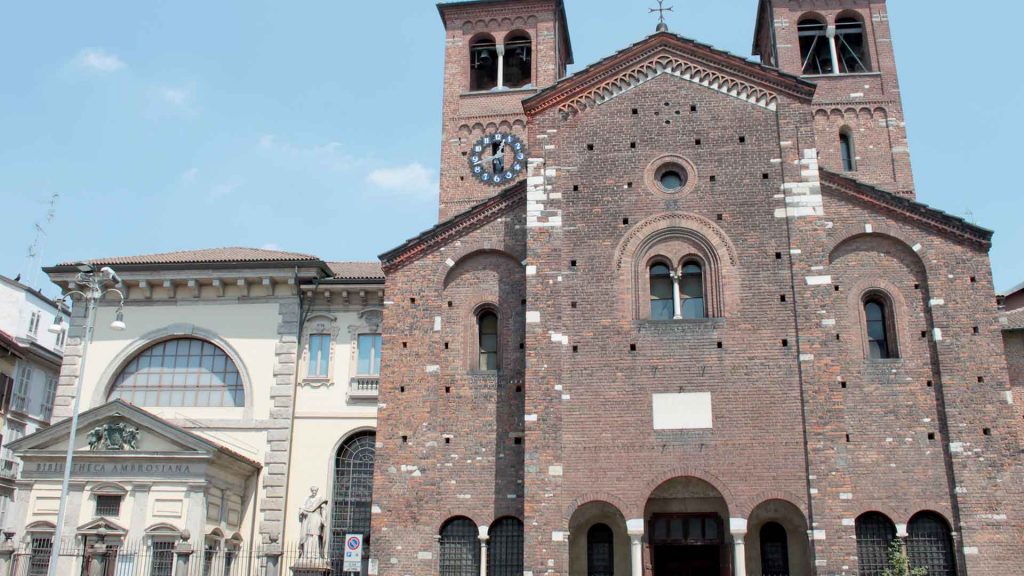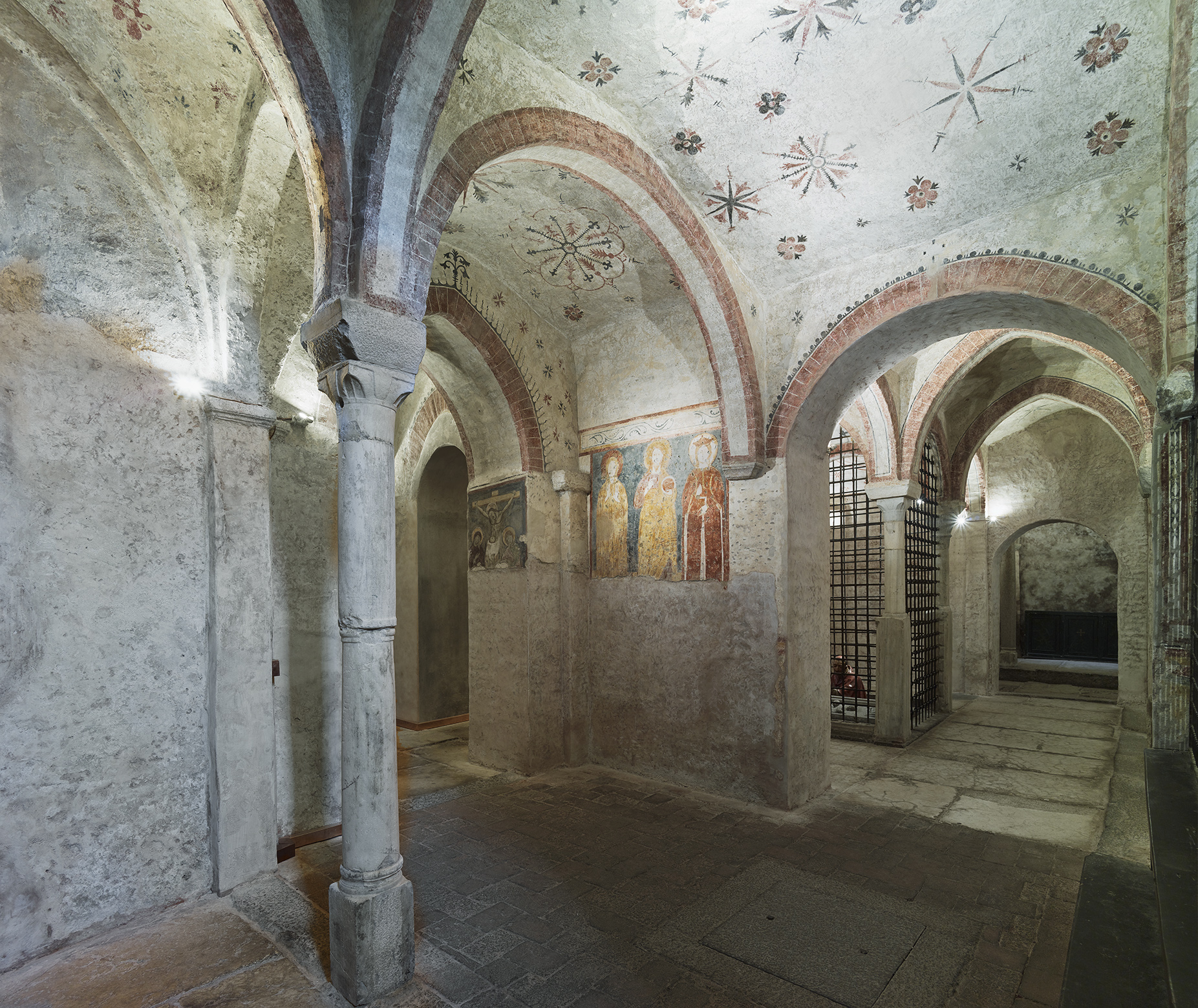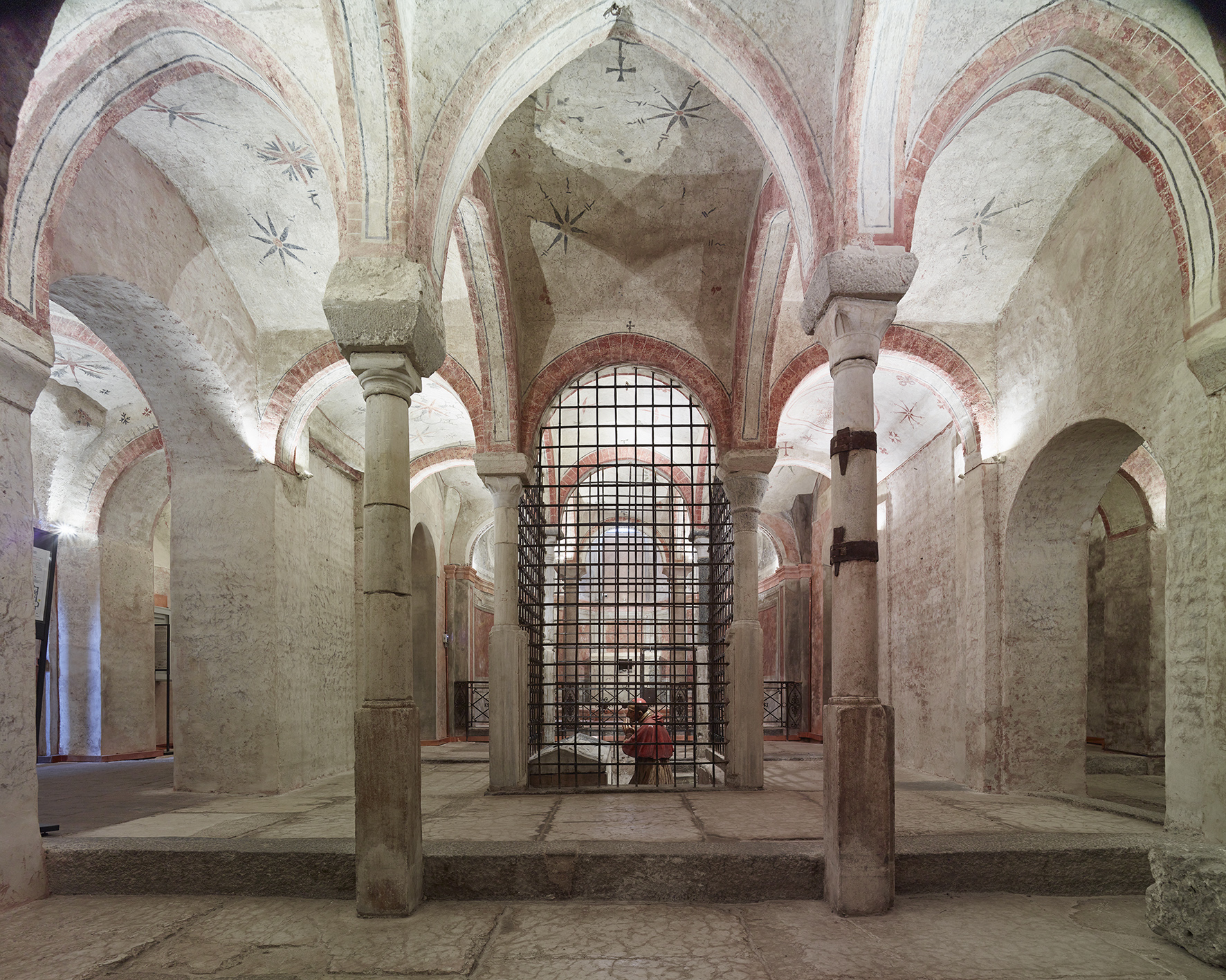Pinacoteca
THE MIDDLE AGES IN MANUSCRIPT BOOKS
An itinerary through the treasures of the Biblioteca Ambrosiana curated by Federico Gallo and Stefano Martinelli Tempesta | Pinacoteca, rooms 2 and 3
The church of San Sepolcro was founded in 1030, when a Milanese moneyer named Rozzone built a church on the ancient Roman forum. Archbishop Ariberto d’Intimiano solemnly consecrated it to the Holy Trinity.
The upper church of San Sepolcro
Its thousand years of history is mingled with that of the Crusades. On 15 July 1100, after the reconquest of Jerusalem, the archbishop of Milan at the time, Anselmo IV da Bovisio, in memory of this extraordinary event, changed its dedication to the church of the Santo Sepolcro. This title was motivated by the presence in its subterranean level, ever since it was founded, of a copy of Christ’s sepulcher. Created by a master craftsman in the early 14th century, according to tradition, its interior contained soil brought by the Crusaders from Jerusalem and other relics of the holy places.
In the second half of the 16th century, the church was chosen by Saint Charles Borromeo as a privileged place of prayer. He undertook a complex renovation of the place of worship, which involved the construction of an urban sacro monte, consisting of 24 chapels devoted to scenes of the Passion.The project, from various causes, was never finished, though some groups were actually completed and can still be seen in the upper church: Jesus washing of the feet of the disciples, Jesus before Caiaphas, the Flagellation and the denial of Peter.
In the following centuries the church underwent various phases of renovation and restoration, which significantly altered its appearance. Even the façade was rebuilt at the end of the 19th century in Romanesque style considered more appropriate to the ancient medieval building.
In 1928, with the suppression of the parish of San Sepolcro, the church was annexed to the Biblioteca Ambrosiana, which still administers it.
Between 2008 and 2011 the complex of the upper church was the subject of an important restoration project by the Superintendency for the architectural and landscape heritage of Lombardy and directed by Pinin Brambilla Barcilon. This shed light on the complex historical and artistic events of which this place, described by Leonardo da Vinci as the “true center of Milan”, has been the protagonist for centuries.

The crypt of San Sepolcro
A profoundly sacred place, the crypt was chosen by St. Charles Borromeo as a personal place of prayer, to which he went every Wednesday and Friday afternoon. It was not uncommon to see him spend whole nights in what he himself called the “gymnasium of the Holy Spirit”, in adoration of the model of the tomb of Christ. For this reason, after his canonisation, a polychrome terracotta statue was placed here depicting the saint kneeling before the sarcophagus. The crypt also enables visitors view one of the most ancient remains of the city’s history. The paving, consisting of large slabs of white ‘Verona’ stone, comes in fact from the pavement of the ancient Roman forum dating from the 4th century, the main public space of the Roman civitas, where all the principal civil and religious activities were held.
The crypt reopened to the public after 50 years in 2016 and, thanks to the MIBAC, in 2018-2019 further restoration works were carried out, recovering the decorated surfaces and renewing the technical installations. On July 22 2019, it opened again to the public.

Piazza San Sepolcro
Milan, Italy
The upper church of San Sepolcro
is open for worship and visitors
at the following times:
Mon – Fri, 10.00 – 17.00
Celebration of Holy Mass:
Mon – Fri, 12.45
Entrance in Piazza San Sepolcro (access from the exit courtyard of the Pinacoteca Ambrosiana)
Open every day from 10.00 to 18.00, last access at 17.30
Wednesday closed
Open at Easter, Easter Monday, April 25, May 1, June 2
ACCESSIBILITY
The site is not accessible to people in wheelchairs or with reduced mobility.
PRICES
CRYPT ONLY
Full price: €8.00 + 1.50 presale
Reduced*: €6.00 +1.50 presale
Under 14: free
CRYPT + AMBROSIANA
Full: € 20.00 + 1.50 presale
Reduced*: €15.00 +1.50 presale
Under 14: €5.00 + €1.50
GROUPS
Groups of 15 or more must book by contacting the group office:
phone: +39 0292897721
email: ambrosiana@vivaticket.com
Mon-Fri 10:00-18:00, excluding holidays
PRICES
CRYPT ONLY
Adults € 6.00 + 1.65 presale
Schools € 2.50 + 0.60 presale
CRYPT + AMBROSIANA
Adults €15.00 + 1.65 presale
Schools € 6.50 + 0.60 presale
Kindergarten groups (children up to 5 years): free
*CATEGORIES ENTITLED TO REDUCTION:
over 65, young people 15-18 and university students with card, MILANOCARD holders, Pogliaghi Museum or Colosso San Carlo di Arona ticket holders within a year of issue, Gallerie d’Italia ticket holders, Intesa Sanpaolo employees, Touring Club members, FAI members, holders of the Duomo Pass or Duomo Fast-track, holders of the Piedmont Valle d’Aosta Museum Subscription, holders of the Società del Quartetto Card, COOP members, Cattolica action members, Amici di Brera members, Artsuppcard holders, ATM employees and annual transport pass holders.
Free admission (Membership of the respective categories must be proven by a valid valid document / card.)
• Children under the age of 14 accompanied by a paying adult (maximum 5 children per adult).
• Authorised guides with registration card and teachers accompanying school groups (1 for every 10 students).
• Journalists who need to visit the Pinacoteca Ambrosiana to review it are admitted for free. They need to submit the accreditation request to the press office with at least 24 hours advance, specifying the name of the publication and the day scheduled for the visit (mail: press@ambrosiana.it). Otherwise, journalists are granted a reduced ticket upon presentation of their journalist card, valid for the current year.
• ICOM members
• There also special free admissions for professional reasons and with the approval of the administration for: superintendents of the fine arts, public officials and scholars-researchers.
For further information: contatti@ambrosiana.it

Piazza San Sepolcro
Milan, Italy
The upper church of San Sepolcro
is open for worship and visitors
at the following times:
Mon – Fri, 10.00 – 17.00
Celebration of Holy Mass:
Mon – Fri, 12.45
Entrance in Piazza San Sepolcro (access from the exit courtyard of the Pinacoteca Ambrosiana)
Open every day from 10.00 to 18.00, last access at 17.30
Wednesday closed
Open at Easter, Easter Monday, April 25, May 1, June 2
ACCESSIBILITY
The site is not accessible to people in wheelchairs or with reduced mobility.
PRICES
CRYPT ONLY
Full price: €8.00 + 1.50 presale
Reduced*: €6.00 +1.50 presale
Under 14: free
CRYPT + AMBROSIANA
Full: € 20.00 + 1.50 presale
Reduced*: €15.00 +1.50 presale
Under 14: €5.00 + €1.50
GROUPS
Groups of 15 or more must book by contacting the group office:
phone: +39 0292897721
email: ambrosiana@vivaticket.com
Mon-Fri 10:00-18:00, excluding holidays
PRICES
CRYPT ONLY
Adults € 6.00 + 1.65 presale
Schools € 2.50 + 0.60 presale
CRYPT + AMBROSIANA
Adults €15.00 + 1.65 presale
Schools € 6.50 + 0.60 presale
Kindergarten groups (children up to 5 years): free
*CATEGORIES ENTITLED TO REDUCTION:
over 65, young people 15-18 and university students with card, MILANOCARD holders, Pogliaghi Museum or Colosso San Carlo di Arona ticket holders within a year of issue, Gallerie d’Italia ticket holders, Intesa Sanpaolo employees, Touring Club members, FAI members, holders of the Duomo Pass or Duomo Fast-track, holders of the Piedmont Valle d’Aosta Museum Subscription, holders of the Società del Quartetto Card, COOP members, Cattolica action members, Amici di Brera members, Artsuppcard holders, ATM employees and annual transport pass holders.
Free admission (Membership of the respective categories must be proven by a valid valid document / card.)
• Children under the age of 14 accompanied by a paying adult (maximum 5 children per adult).
• Authorised guides with registration card and teachers accompanying school groups (1 for every 10 students).
• Journalists who need to visit the Pinacoteca Ambrosiana to review it are admitted for free. They need to submit the accreditation request to the press office with at least 24 hours advance, specifying the name of the publication and the day scheduled for the visit (mail: press@ambrosiana.it). Otherwise, journalists are granted a reduced ticket upon presentation of their journalist card, valid for the current year.
• ICOM members
• There also special free admissions for professional reasons and with the approval of the administration for: superintendents of the fine arts, public officials and scholars-researchers.
For further information: contatti@ambrosiana.it